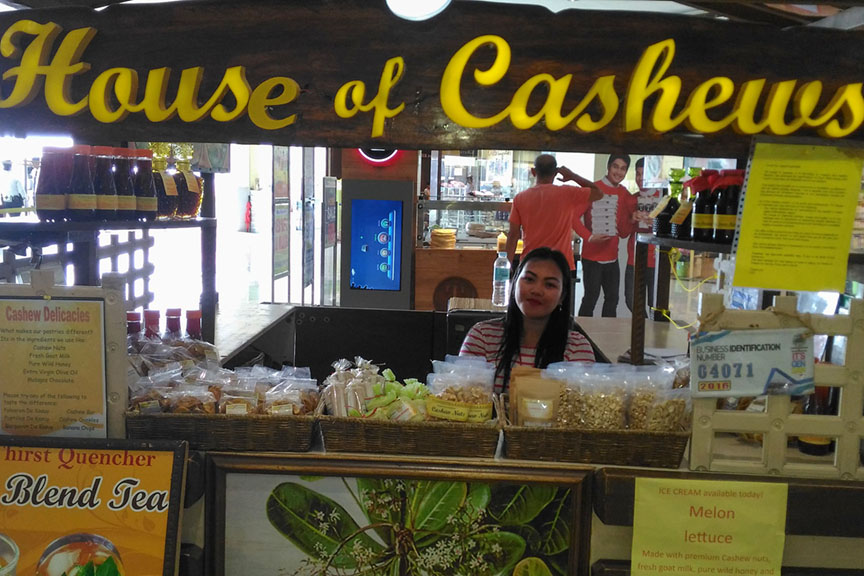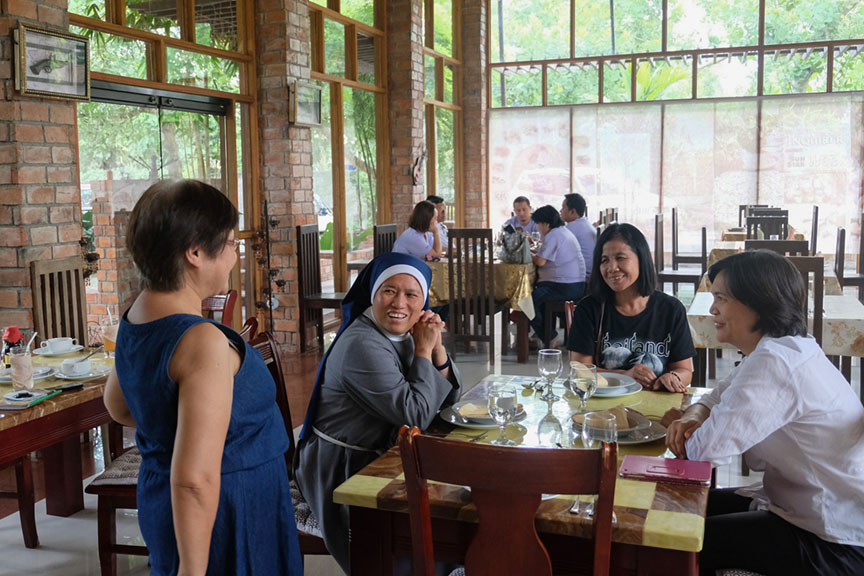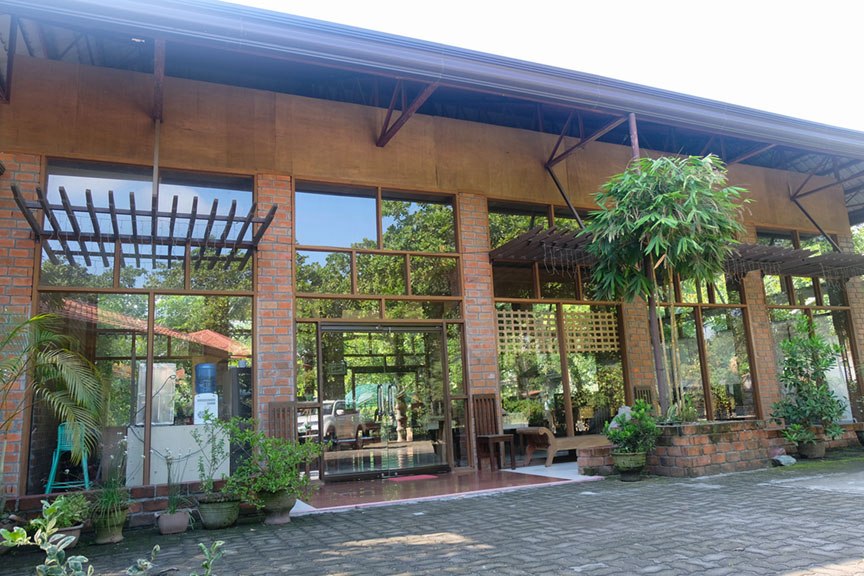POLOMOLOK, South Cotabato (MindaNews / 6 Sept) – Although not really a popular cash crop among Filipino farmers, a family here has found a goldmine in cashew, a journey that started 20 years ago.
 The FK House of Cashews outlet in one of the malls in General Santos City. MindaNews photo by BONG S. SARMIENTO
The FK House of Cashews outlet in one of the malls in General Santos City. MindaNews photo by BONG S. SARMIENTO
The husband and wife tandem of Aniceto and Lorna Grace Fuentespina built their fortune from the pricey nuts that is also helping dozens of families in several parts of Mindanao who are involved in their venture.
At Barangay Silway 8 here, the FK House of Cashews organic garden restaurant was born five years ago, a testament to the couple’s successful journey marked by lots of sweat and tears after 14 years in the cashew industry.
Settled in a bucolic property spanning less than a hectare dotted by more than 50 cashew trees, everyone is welcome to enter the glass house that cashew, also called “kasuy,” built and feast on various delicacies all spliced up with cashew nuts at reasonable prices.
The FK House of Cashews offers gustatory delights such as garden salad, lasagna, fresh lumpia, kare-kare and rosemary chicken. For drinks, they serve tea concoctions from herbs grown in their garden. They don’t cook pork dishes.
“What really brought us this far is our passion,” Lorna said.
The restaurant is the offspring of their cashew nuts venture, which they started in 1998.
 Lorna Grace Fuentespina entertains guests dining at the FK House of Cashews organic garden restaurant in Polomolok, South Cotabato. MindaNews photo by BONG S. SARMIENTO
Lorna Grace Fuentespina entertains guests dining at the FK House of Cashews organic garden restaurant in Polomolok, South Cotabato. MindaNews photo by BONG S. SARMIENTO
Their cashew nuts and cashew variants of pastillas and polvoron, as well as their pure honey and honey glazed banana or kamote chips, are distributed in various stores across the country under the trade name Fuentespina Kasuy.
The enterprise’s marketing slogan of “Excellence thru Experience” reflects its durability in the business.
When they were starting the business, the couple, who has three daughters, was just renting the lot beside their organic garden restaurant where the family now lives.
Because of their achievement, the provincial government of South Cotabato recognized the FK House of Cashews as the most outstanding small enterprise in 2016.
Lorna urged farmers in Mindanao to plant cashew trees due to its cash potentials driven by good market demand for nuts. Currently, the couple buys cashew seeds at P75 per kilogram.
To produce a kilo of cashew nuts, it requires at least five kilos of seeds. The seeds are taken from the cashew apple, or the fruit of the cashew tree, which has no commercial value.
 The FK House of Cashews organic garden restaurant in Polomolok, South Cotabato. MindaNews photo by BONG S. SARMIENTO
The FK House of Cashews organic garden restaurant in Polomolok, South Cotabato. MindaNews photo by BONG S. SARMIENTO
Current prices of a kilo of ready-to-eat cashew nuts fetch a hefty P1,300, said Lorna, encouraging farmers to also do the processing so they can earn bigger income.
In Soccsksargen, Davao and Northern Mindanao regions where Fuentespina Kasuy sources their cashew seeds, there is only a little over 200 hectares planted to the crop as of 2015, according to the Philippine Statistics Authority November 2017 report.
Mimaropa region is the top cashew producer in the country with almost 30,000 hectares planted to the crop, the PSA data showed.
During summer, which is cashew’s peak season, Lorna said they employ at least 50 individuals to crack the seeds and peel the nuts. They are besides the six regular restaurant staff.
Lorna, a former teacher, recalled they bumped into their gold mine when they were still living in Cagayan de Oro City, where her husband Aniceto, who hails from Isulan, Sultan Kudarat, started trading processed cashew nuts to Manila in the 1990s.
After just a few months, they decided to settle in South Cotabato because during that time, around 100 hectares in nearby General Santos City were planted with cashew through the help of foreign donors.
The cashew plantation there dwindled over the years apparently due to mismanagement.
Lorna stressed the market for cashew nuts in the country is wide due to the limited supply.
“The market for cashew nuts is actually not a problem for us. It is the supply to meet our demand,” she said.
“There’s actually a lot of room for growth in this industry,” she added.
For a hectare of land, it can accommodate 100 trees. A tree could yield 15 kilos of cashew seeds three years after planting, or at least P112,000 per hectare annually.
Originating in West Indies and native to North Brazil, cashew nuts have taken roots in the Philippine soil more than a century ago or shortly before the American colonization.
Usually, the couple transacts with their customers on a cash-to-cash basis only. They have a cart in one of the malls in General Santos City showcasing their products.
Lorna said that they can dispose their supply of cashew nuts “just like hot cakes.”
Cashew nuts, she said, actually has many healthy benefits and is an excellent energy food.
Unlike other nuts, cashew has lower fat content – approximately 65 percent of its fat is unsaturated fatty acids. Ninety percent of this unsaturated fat content is oleic acid, the same heart healthy monounsaturated fat found in olive oil.
Studies showed that oleic acid promotes good cardiovascular health, even in individuals suffering from diabetes.
In addition, cashew nuts are good sources of copper, magnesium, zinc and biotin needed by the human body, it added. (Bong S. Sarmiento / MindaNews)
